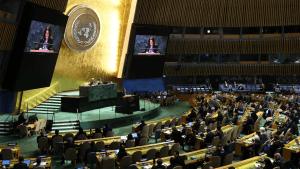Russia Ukraine Latest: The Global Stage and Double Standards
By Parrot Newspaper Editorial Board
In a move that has sent shockwaves across the international community, the United States, alongside Russia, voted against a United Nations resolution condemning Russia’s war against Ukraine. This decision raises critical questions about global politics, the credibility of international diplomacy, and the selective morality of world powers.

For years, the U.S. has positioned itself as a global advocate for democracy, human rights, and the rule of law. Its consistent criticism of Russia’s aggression in Ukraine has been a hallmark of Western diplomacy. Yet, standing shoulder to shoulder with Russia on such a pivotal resolution undermines not only the moral high ground the U.S. claims but also confuses its allies and adversaries alike.
What changed? Is this a case of political pragmatism overshadowing principle? Or is the U.S. recalibrating its global strategy in ways that defy traditional alliances? Whatever the reason, the optics are troubling. At a time when Ukraine needs unequivocal support against aggression, this vote sends mixed signals that could embolden Russia while disheartening those fighting for sovereignty.
Russia Ukraine Latest: The Global Stage and Double Standards
It’s essential to recognize that diplomacy is often a balancing act of competing interests. The U.S. may have its reasons—geopolitical calculations, backroom negotiations, or concessions on unrelated matters. However, aligning with Russia on a vote that addresses a blatant violation of international norms risks eroding the very foundations of multilateral cooperation.
Nigeria, and indeed Africa, should watch these developments closely. They highlight the inconsistencies in global politics where powerful nations preach one thing and practice another. For countries striving for genuine sovereignty and fairness on the world stage, this serves as a reminder: in global diplomacy, interests often trump ideals.
The world deserves better from its so-called leaders. Principles, not politics, should guide decisions that impact millions.


